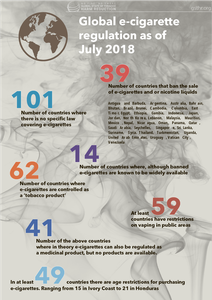Global E-Cigarette Regulation as of July 2018
Global E-Cigarette Regulation as of July 2018
Knowledge•Action•Change (2018)Harry Shapiro - No Fire, No Smoke: The Global State of Tobacco Harm Reduction

It may come as a surprise to both those in tobacco control and those advocating for tobacco harm reduction that at present most countries do not have any specific law regulation regarding e-cigarettes: 101 countries have no specific law on e-cigarettes. It is possible that if it came to a government or court decision, it might be that in some of these countries e-cigarettes would be found to be covered by tobacco control legislation. However, this has yet to be determined in many countries. This includes many LMIC, where it is likely that e-cigarettes are not yet available or are only used by a minority.
At the other end of the spectrum there are 39 countries where the sale of e-cigarettes or nicotine liquids is banned. It is worth noting that rather like the failure of bans on recreational drugs to be effective, e-cigarettes are known to be available in at least 14 of these 39 countries. For example, e-cigarettes and nicotine are widely available and used in Australia. Some of the banning countries had pre-existing laws in which e-cigarettes and nicotine liquids were caught up – as again for example in Australia where the poisons regulations under the jurisdiction of the Therapeutic Goods Administration (TGA) prohibit the unauthorised sale, possession and use of nicotine (see box). Several countries have a legal and regulatory framework for e-cigarettes, and this is generally a mix of a legal framework – often within the context of tobacco control legislation (as in the USA and Europe), plus product standards and legal or voluntary control over access to the products by young people. The most usual legislative route is to regard them as tobacco products, and/or as consumer products.
In most jurisdictions manufacturers are only allowed to promote e-cigarettes as safer than cigarettes and as aids to quitting if they are registered as medicinal products, similar to the regulations governing nicotine replacement therapies. In ten countries there is provision for medically regulated products.
See also p. 84 of the report: No Fire, No Smoke: The Global State of Tobacco Harm Reduction 2018 — Global State of Tobacco Harm Reduction (gsthr.org)